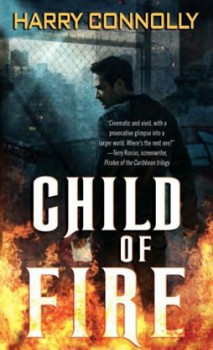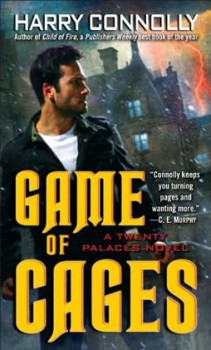Harry Connolly and the Black Gate Interview
 When people tell us about their favorite Black Gate authors and stories, one name that inevitably turns up in both staff and fan discussions is Harry James Connolly, whose tales have appeared three times now in our pages, with more on the way. You may not have seen much of him lately over at Black Gate, but he’s been very busy writing some best selling novels. You can find all about that over here, and a little bit more about Harry and his writing if you just keep reading.
When people tell us about their favorite Black Gate authors and stories, one name that inevitably turns up in both staff and fan discussions is Harry James Connolly, whose tales have appeared three times now in our pages, with more on the way. You may not have seen much of him lately over at Black Gate, but he’s been very busy writing some best selling novels. You can find all about that over here, and a little bit more about Harry and his writing if you just keep reading.
A Conversation with Harry Connolly
Conducted and transcribed by Howard Andrew Jones October 3 – Oct 10 2010
BG: First tell us how long you’ve wanted to be a writer, and how long you were mulling over the novel that launched your career before you finally sat down to draft it.
I’ve wanted to be a writer since I was very small. I was an early reader — like, age 3 — and when my parents explained that people made a living writing books like the one in my hands, I knew that’s what I wanted to do.
Not that I had any idea what that meant. I do have a distinct memory of sitting in kindergarten learning to write the letter “M” and thinking this is totally going to come in handy! (to paraphrase my young self).
As for Child of Fire, it’s a setting that I’ve written in before (some short fiction and a pair of novels–but with different characters), butI knew I wanted to do something very specific with it. I spent several weeks working out the story and, more importantly, the tone before I dug into the writing.
BG: Did you envision Ray as a continuing character from the first, or did you see his potential as you got deeper and deeper into the first draft? Do you have more plans for him?
Actually, in a very early draft, Annalise killed him stone dead at the end! Luckily, I wised up and spared him.
I do have plans for him, but they’re loose. I’m not one of those people who outline a 20-book series ahead of time. The end of book 3 leaves him in a different situation; if Del Rey want more books, I’ll explore that.
BG: I know your work because of your Black Gate short stories. As a matter of fact, you have a lot of fans on the Black Gate staff, and when we talk about favorite stories your name always comes up. How did short story writing influence your novel writing, if at all? Do you prefer working in short form or longer form?
The main problem is that I don’t read much short fiction any more. I’ll read Black Gate and some of the entries on Tor.com but beyond that I hardly bother. I’m not sure why.
And it feels like cheating to write short stories when I hardly read them.
 BG: I’ve heard it said that religious magic annoys you — has it always bothered you, or was there some point at which vampires and crosses and the like reached critical mass?
BG: I’ve heard it said that religious magic annoys you — has it always bothered you, or was there some point at which vampires and crosses and the like reached critical mass?
I’m not a huge fan of holy symbols with magic powers, it’s true. I dislike the way it turns God into a Powerful Force for Our Side Good.
To me, a vampire is a victim: someone gets attacked on the street, then bitten, then killed. Doesn’t that sound like a crime victim? They rise again later and try to feed and sustain themselves–the way anything does–and suddenly crosses burn them or they can’t enter holy ground. Please. I call bullshit on that.
If you want me to believe in a supposedly-forgiving Christian god, you’ll have to have him stop punishing crime victims. Also, if he’s going to burn a killer like a vampire he should be punishing the Ted Bundys of the world the same way. If you want your vampires to burn at the touch of a cross, John Wayne Gacy should, too.
I should point out that my objections aren’t theological. I’m an atheist. It just doesn’t seem like sensible world-building.
BG: How do you approach good and evil in your work? Do you have any advice for writers who want to bring the supernatural to life in the modern world?
In my books, after revisions were finished, I made certain to search for two words/phrases. The first was “black magic.” Leaving aside the problematic nature of calling an evil thing “black” or “dark” (I love the dark; that’s when I do my best sleeping), the magic in the Twenty Palaces books isn’t aligned with good or evil. It’s just power; the right or wrong of it lies in its use.
The second thing I search for is the word “evil.” The only time I allow it in the book is when one of the protagonists is forced to do something terrible, and knows it.
Which isn’t to say that there isn’t evil in my books. There is, but no one calls it that. They call it self-interest, moral rectitude, a little fun, a powerful desire… sometimes they call it justified losses. But they don’t think of themselves as evil
But for folks planning to put supernatural good or evil into their settings, I say stop and rethink it until they find something more complex and human.
BG: In an ideal world, in five years, what other Harry Connolly books will we have seen on bookstore shelves?
Well, there should be Twenty Palaces book 3, Circle of Enemies of course. I’m also working on something new, outside the 20P setting; it’ll be lighter, less-violent, and hopefully a little funny.
After that, who knows? It’s past time I wrote some traditional fantasy (at least, as traditional as I can manage), and I’ve always wanted to write the story of Zed burning down the city of Pald with just a few well-place schemes…
[…] other news, I have an interview at Black Gate today, in which I talk about “black” magic, evil and human motivations, among other […]
[…] of other sales here, too. I also spoke about the details of my first novel sale last Saturday, and my interview with Howard Andrew Jones appeared […]
[…] I approached this book with some trepidation because I was already a fan of Harry Connolly’s Twenty Palaces urban fantasy series (interview here). […]